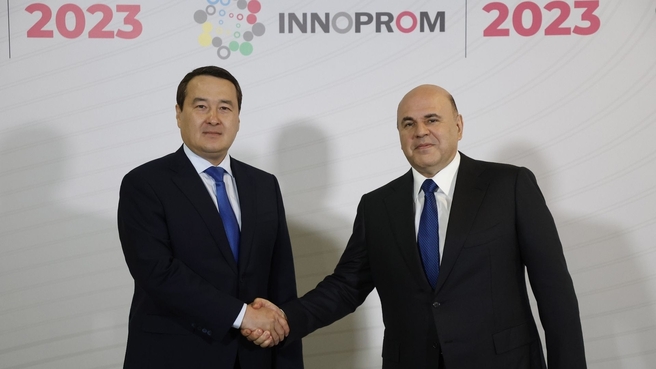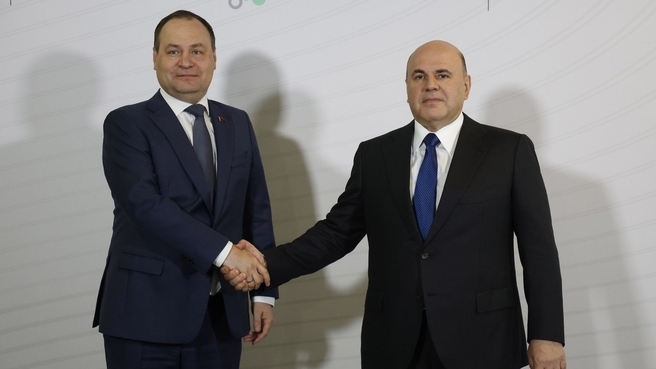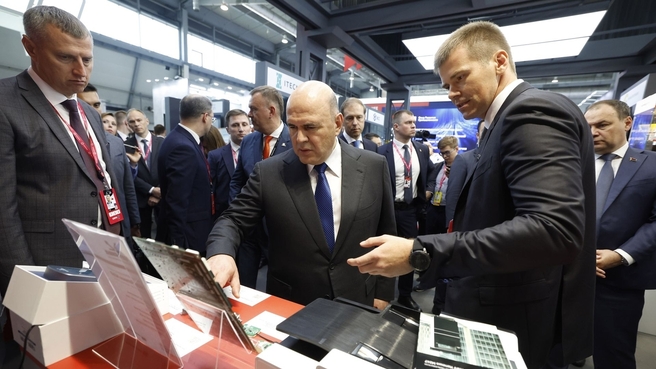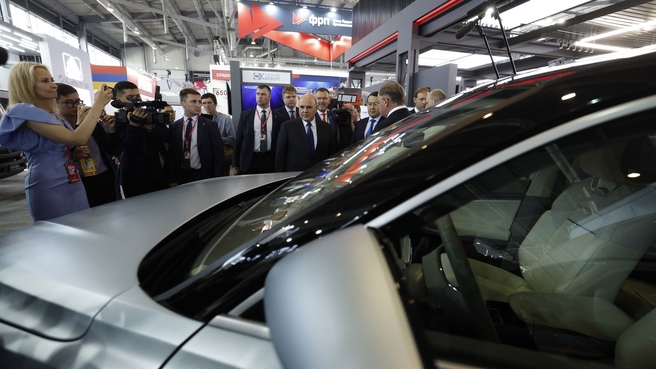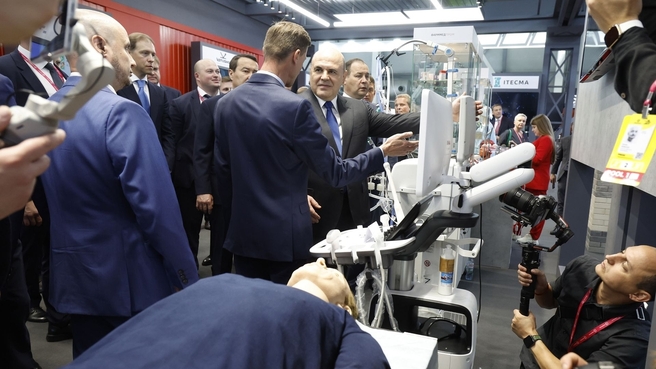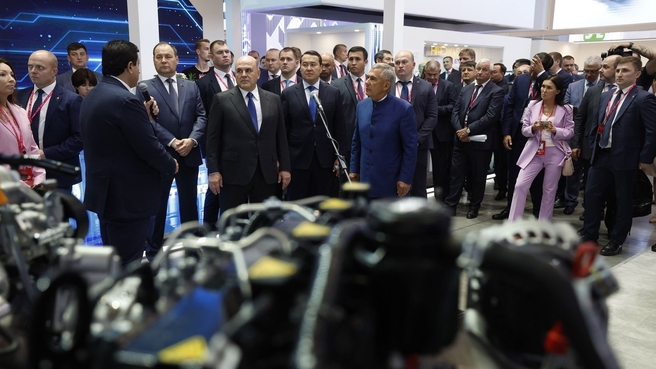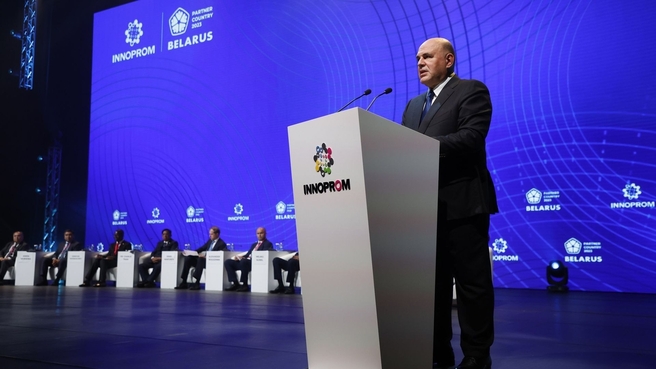Mikhail Mishustin addressed the INNOPROM 2023 main strategic session, Sustainable Production: Update Strategy.
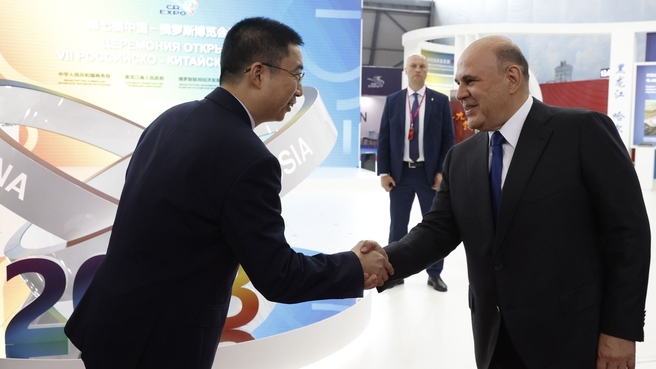
Mikhail Mishustin inspects the Russia-China EXPO stand at Innoprom-2023, with Vice-Governor of Heilongjiang Province Han Shengjian
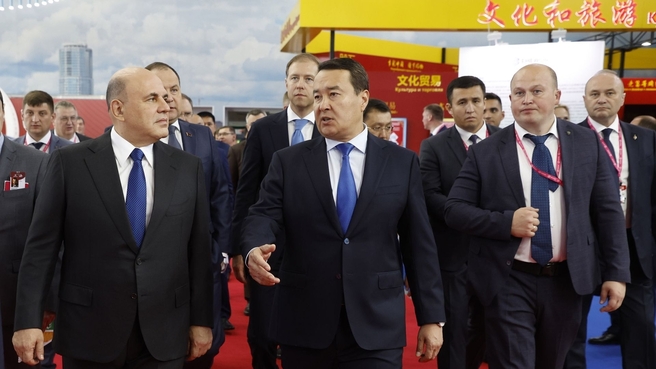
Mikhail Mishustin, Prime Minister of Kazakhstan Alikhan Smailov and Prime Minister of the Republic of Belarus Roman Golovchenko at the International Industrial Trade Fair INNOPROM 2023
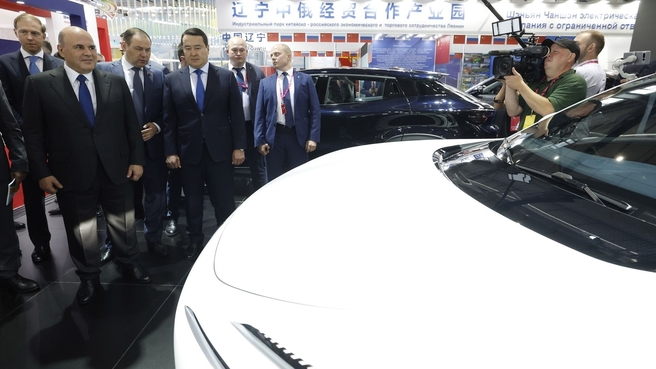
Mikhail Mishustin, Prime Minister of Kazakhstan Alikhan Smailov and Prime Minister of the Republic of Belarus Roman Golovchenko at the International Industrial Trade Fair INNOPROM 2023
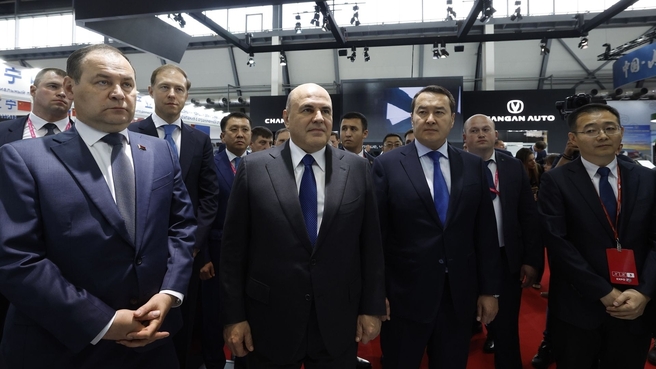
Mikhail Mishustin, Prime Minister of Kazakhstan Alikhan Smailov and Prime Minister of the Republic of Belarus Roman Golovchenko at the International Industrial Trade Fair INNOPROM 2023
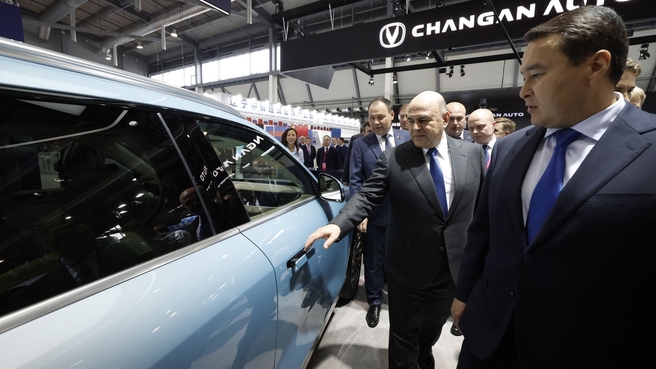
Mikhail Mishustin, Prime Minister of Kazakhstan Alikhan Smailov and Prime Minister of the Republic of Belarus Roman Golovchenko at the International Industrial Trade Fair INNOPROM 2023
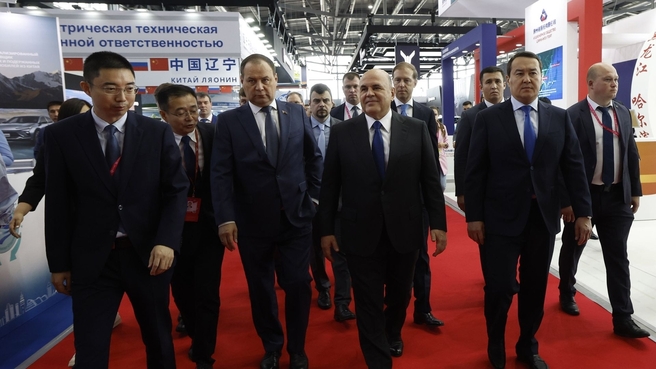
Mikhail Mishustin, Prime Minister of Kazakhstan Alikhan Smailov and Prime Minister of the Republic of Belarus Roman Golovchenko at the International Industrial Trade Fair INNOPROM 2023
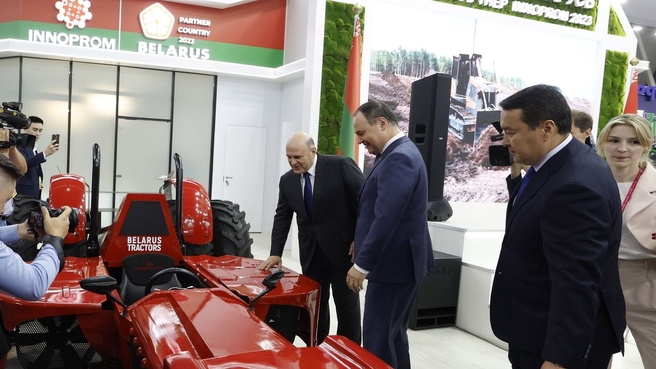
Mikhail Mishustin, Prime Minister of Kazakhstan Alikhan Smailov and Prime Minister of the Republic of Belarus Roman Golovchenko at the International Industrial Trade Fair INNOPROM 2023
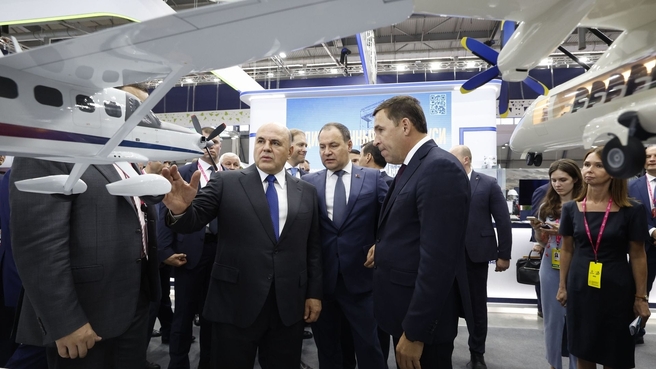
Mikhail Mishustin and Prime Minister of the Republic of Belarus Roman Golovchenko at the International Industrial Trade Fair INNOPROM 2023
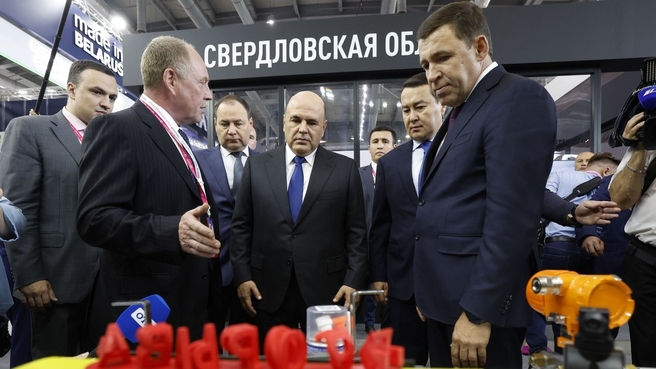
Mikhail Mishustin, Prime Minister of Kazakhstan Alikhan Smailov and Prime Minister of the Republic of Belarus Roman Golovchenko at the International Industrial Trade Fair INNOPROM 2023
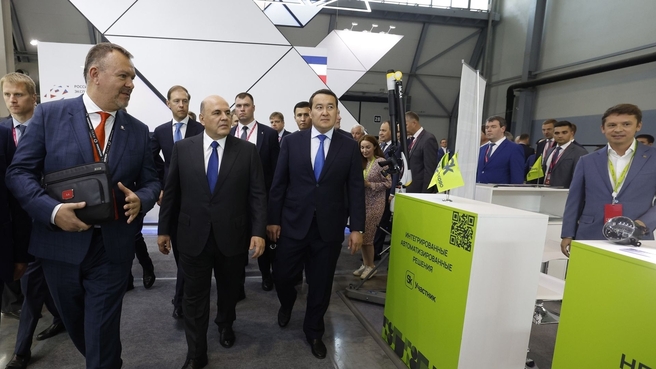
Mikhail Mishustin and Prime Minister of Kazakhstan Alikhan Smailov at the International Industrial Trade Fair INNOPROM 2023
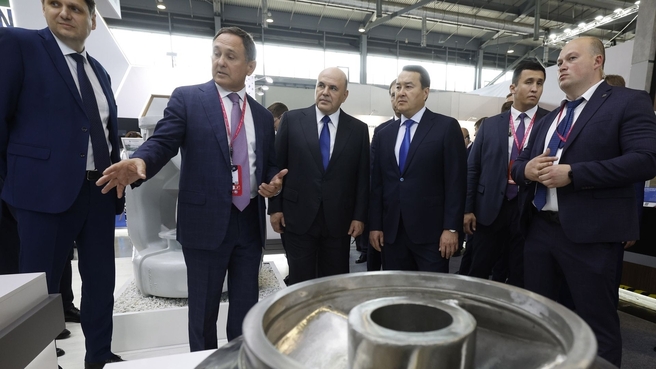
Mikhail Mishustin and Prime Minister of Kazakhstan Alikhan Smailov at the International Industrial Trade Fair INNOPROM 2023
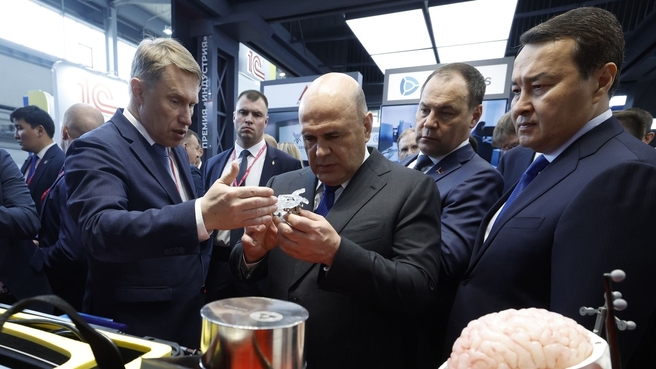
Mikhail Mishustin, Prime Minister of Kazakhstan Alikhan Smailov and Prime Minister of the Republic of Belarus Roman Golovchenko at the International Industrial Trade Fair INNOPROM 2023
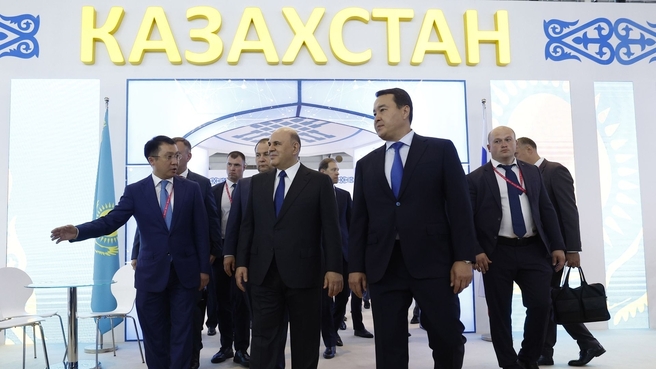
Mikhail Mishustin, Prime Minister of Kazakhstan Alikhan Smailov and Prime Minister of the Republic of Belarus Roman Golovchenko at the International Industrial Trade Fair INNOPROM 2023
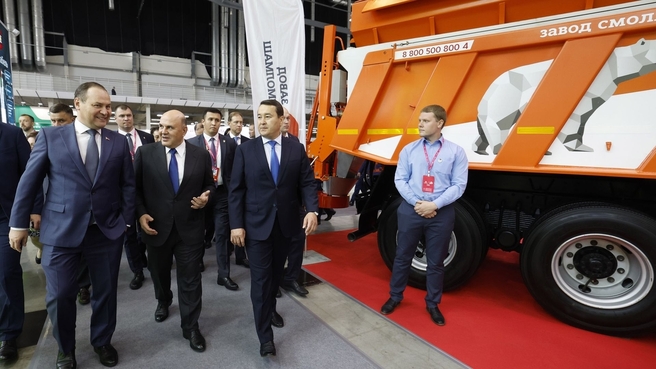
Mikhail Mishustin, Prime Minister of Kazakhstan Alikhan Smailov and Prime Minister of the Republic of Belarus Roman Golovchenko at the International Industrial Trade Fair INNOPROM 2023
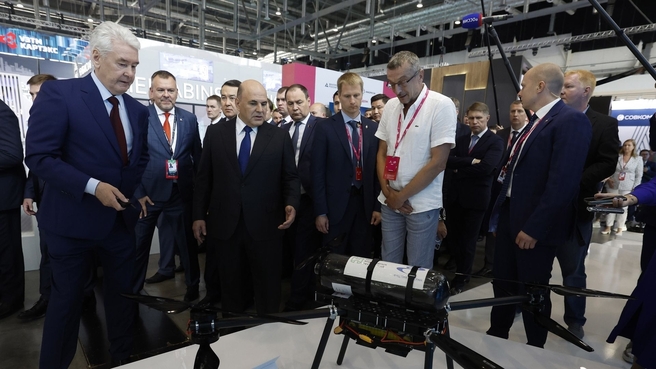
Mikhail Mishustin, Prime Minister of Kazakhstan Alikhan Smailov, Prime Minister of the Republic of Belarus Roman Golovchenko and Moscow Mayor Sergei Sobyanin at the International Industrial Trade Fair INNOPROM 2023
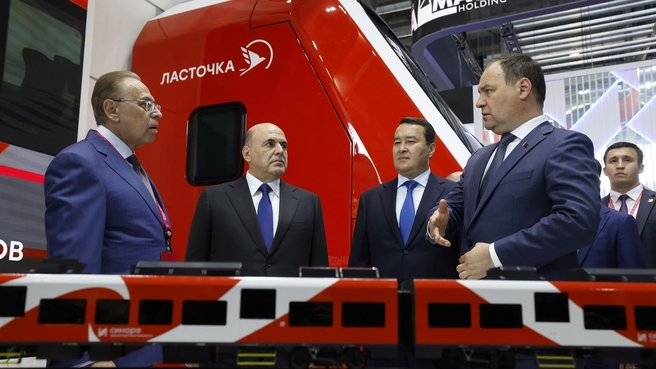
Mikhail Mishustin, Prime Minister of Kazakhstan Alikhan Smailov and Prime Minister of the Republic of Belarus Roman Golovchenko at the International Industrial Trade Fair INNOPROM 2023
Mikhail Mishustin and Prime Minister of Kazakhstan Alikhan Smailov
The Yekaterinburg EXPO International Exhibition Centre has been hosting the International Industrial Trade Fair INNOPROM 2023 since 2010.
The theme of the 2023 trade fair is Sustainable Production: Update Strategies. The agenda includes metal processing technologies, digital manufacture, transport engineering, technologies for the energy sector, new materials, industrial IT solutions, medical equipment, technologies for cities and component manufacturing. Delegations from 16 foreign states are attending the fair, with 8 delegations setting up national displays. The trade fair also features 25 displays by various territories of the Russian Federation.
Belarus is an INNOPROM 2023 partner country. Belarus’ national stand has an area of 3,000 square metres and features 130 Belarusian enterprises and over 430 exhibits. Leading Belarusian enterprises, including BELAZ, the Minsk Tractor Plant, BATE and the Minsk Automotive Plant, are taking part in the industrial trade fair. The fair will showcase new inventions in several fields, including light industry, the food industry, IT solutions and farming equipment. The Belarusian Ministry of Energy is presenting innovations for power grids, green energy and utility meters.
The trade fair’s business programme offers over 100 events including conferences, seminars, and corporate and regional presentations. Key events include the main INNOPROM 2023 strategic session, the Industria awards ceremony, the 2nd Young Industrialist of the Year awards ceremony and several business forums. Other events include a special forum for components manufacturers and a dialogue with Russian trade delegates from foreign states.
The Industria national industrial award of the Russian Federation was instituted in 2014 to promote the introduction of advanced industrial technologies and to raise public awareness of advanced Russian corporate practices in industrial development.
After reviewing multiple applications, the expert council for conferring the Industria national industrial award selected five finalists: Aksalit Soft Ltd., Metiz Proizvodstvo Ltd., Pigment Co., R-Pharm, and C3D Labs. The winner will be announced at the main INNOPROM strategic session. Each year, over 150 companies that have implemented civilian projects submit applications.
Excerpts from the transcript:
Mikhail Mishustin: Good afternoon, ladies and gentlemen, Mr Golovchenko, Mr Smailov. Friends and colleagues,
I welcome all guests and participants at our country’s main industrial expo. For the past 13 years, it has been held in Yekaterinburg, a major industrial centre of the Urals. It is a very important platform for exchanging opinions and best practices and searching for the optimal ways to develop the key sectors.
We see that the interest in the Russian economy is not only maintaining but continues growing despite our opponents’ attempts to cut us off from global production chains, logistics routes and payment systems.
This year, over 1,000 companies from more than 35 countries are presented at the expo. They all gathered to build relationships and agree on mutually beneficial contracts.
This year’s partner country of Innoprom is Belarus, our closest ally and good neighbour. Together we are building the Union State. I would like to welcome the republic’s delegation and Prime Minister Roman Golovchenko personally, and to thank them for such a large exposition that represents contemporary projects and developments.
I also want to welcome Prime Minister of the Republic of Kazakhstan Alikhan Smailov. There are 250 companies from Kazakhstan taking part in the expo. Cooperation between our countries is based on the principles of friendship, strategic partnership and alliance. We continue the implementation of major joint investment projects in important sectors.
I also am happy to greet our colleagues from all friendly countries here at Innoprom. There are companies from the Middle East, Africa, Central and Southeast Asia. Russia is open to cooperation, as President Vladimir Putin has said repeatedly, and we are ready to develop partner relations in industry, technology, and innovations.
It is important that the Innoprom venue is also hosting the 7th Russia-China EXPO. Some 500 companies from the People’s Republic of China are presenting their products. I am sure that participation in these events will facilitate new agreements, attract investment and will overall strengthen industrial cooperation with our Chinese friends.
President of Russia Vladimir Putin and President of the People's Republic of China Xi Jinping determined the main areas for collaboration, and determined that all the agreements reached by the two leaders should lead to specific results.
We have every opportunity for this. Our country is consistently managing all the challenges. Over the past four years, industrial production has increased by 7 percent. At the same time, this year, our positive dynamics have accelerated even in the context of supply chain challenges and unprecedented sanctions pressure.
In March, this indicator grew by over 1 percent, in April, by more than 5 percent, and in May it exceeded 7 percent, annualised. At the same time, the production index in the manufacturing industry increased by 12.8 percent in May. The President set the goal to ensure an increase in this sector, including its share in the gross domestic product. We will gradually increase it.
The machine-building complex remains the main driver. Production in this sector increased by almost 1.5 times in May compared to the same period last year. Among other areas, this positive performance can be seen in the automotive industry and in machinery and equipment manufacturing.
Growth in metallurgy and the chemical industry also accelerated. An important task to be resolved in the near future is to increase the sustainability of production in the new conditions. To do this, it is necessary to minimise the influence of unfavourable external conditions. This means achieving full technological sovereignty in all critical industries without exception. Of course, this is a serious challenge for industry, but there will be no returning to the previous models of production based on the import of foreign technologies.
Let me stress that our future lies in the development of the entire range of domestic high-tech products. Moreover, they should be competitive not only within the country, but also abroad, which requires fundamentally new approaches and a completely different level of interaction between science, industry and the state. Therefore, a little over a month ago, the Government approved the concept for the country’s technological development, which will give a powerful impetus to the implementation of key areas, such as machine-tool industry, radio electronics, small-tonnage chemicals, shipbuilding and aircraft building. Other areas include the designing of high-capacity gas turbines, diesel and piston engines, unmanned aerial vehicles, medical devices, and medicines.
In total, at least ten megaprojects will be launched, with guaranteed funding for the entire implementation period. Implementation will also help the formation of the entire technological chain of production of raw materials, materials, components and parts. And it will ensure the maximum independence and self-sufficiency of our industry as a whole.
Special attention will be paid to training highly qualified personnel and increasing the attractiveness of the industrial worker and engineering professions. We are already doing this, including within the framework of the Professionals project, which allows us to fully factor in the needs of enterprises for employees. It is important that the updating of education standards and training programmes should be ahead of the curve.
And of course, the development of the real sector of the economy should be directly connected to environmental and climate change issues.
It is necessary to more actively reduce the impact on nature, introduce water recycling and apply the best available technologies.
The President has set a goal to halve emissions of hazardous pollutants within the next seven years. This work is already underway in 12 industrial centres, and within three years these emissions will be reduced by at least 20 percent. And from 1 September, we will start implementing such measures in 29 more cities.
We will closely control and monitor these projects.
Our joint work with Belarus plays an important role in achieving technological sovereignty.
As a follow-up to the agreements reached by our presidents, an intergovernmental agreement on the implementation of projects in industrial cooperation was signed at the end of last year. Today, 16 projects totalling almost 80 billion roubles have been approved. Practical activities have already started on almost all of them.
Together with our Belarusian colleagues, we are implementing a Union programme for the formation of a common industrial policy. Under this programme, 11 priority industries have been identified. These are radio and microelectronics, pharmaceuticals, light and automotive industries, heavy, oil and gas and agricultural engineering, and, of course, machine-tool manufacturing, and petrochemicals.
Joint projects have already been implemented in each of these areas. In particular, dozens of Belarusian plants manufacture components for our major car manufacturers. Russian companies produce modern high-tech engines for specialised Belarusian machinery. We were convinced of this direction for cooperation today when we looked at the joint display stands. There are many more examples of successful cooperation.
Colleagues!
Each sector, from automobile manufacturing to energy machine-building needs to be as resilient to the sanctions as possible. To that end, we need to reach a new level of competitive ability in each main manufacturing industry.
The main priorities for our companies today are an utmost comprehensive localisation of industrial products, saturation of domestic demand and increasing exports of value-added products. These are probably the most important things.
Russia can significantly increase its share of composite materials sales on the global market. With its unique reserves of rare-earth metals, Russia can become a global leader in this sector.
In metallurgy, we need to expedite the transition to a more improved technological paradigm to increase the output of high value-added products, including stainless steel rolled metal and pipes, ultrathin foil, aluminum alloy items, and many others.
Engine manufacturing faces ambitious challenges. This year, the output of power units, or engines, should exceed the maximum production volumes of Soviet times. The United Engine-Building Corporation plans to deliver over 2,500 engines to customers, including for civil aviation.
In the timber processing sector, it is necessary to modernise the capacity for deeper processing of timber and to build contemporary, environmentally friendly pulp and paper plants. It is also important to launch domestic production of harvesting and logging equipment as almost all of these companies have faced lack of availability after the departure of the Western makers.
Given the current development of transport technologies, other priorities include the creation of new major sectors. One of them is the production of electric cars (EVs). Last year, EV production began in the Lipetsk Region and this year in the Moscow Region. In 2025, plans call for opening an assembly plant in Tatarstan.
Another area is civilian autonomous aviation systems. This can become a growth driver for many sectors of the economy and various services. It is necessary to develop drone production, including their components, parts and units. We will be launching a national project for this soon.
Developing our own technology to build high-speed railway is another important industry. Innovations in this area will help bring the Russian economy to a new stage of development.
At the same time, systematic work is already underway to replace the foreign components in locomotives. A new generation of the Russian Ivolga electric trains is being tested on the Moscow Central Diameter lines. Here, in the Sverdlovsk Region, they have already converted to the production of an updated version of the Lastochka electric train with completely domestic systems and units. Today we visited the stand and looked at it.
This is just the beginning. Both of these projects will lay the foundation for the country’s rolling stock for suburban commuter trains.
Let me stress that opportunities for Russian businesses have expanded significantly. And the state is ready to help our businesses develop those areas that until recently were occupied by foreign competitors.
In line with the President’s instructions, the Government has readjusted support mechanisms and created new ones to support many industries.
The Industrial Development Fund has proven effective. Last year, domestic companies received preferential loans for a record amount of 140 billion roubles. These funds were directed towards the development of the necessary materials and components.
I would like to note separately the instruments that were created to restart the investment cycle and to attract private capital to the real sector.
At the initiative of the President, the Government has launched an industrial mortgage programme. In less than a year, more than 150 preferential loans worth almost 14 billion roubles were issued to acquire and rebuild production facilities. And now more than 200 loan agreements worth 24 billion roubles are in the final approval stage.
In order to increase the production of priority products, we have also introduced a cluster investment platform mechanism, at which 12 projects with a total value of 320 billion roubles have been approved. About another 40 are underway, valued at over 1 trillion roubles in total.
At the St Petersburg International Economic Forum, the President announced that it was necessary to increase the flow of funding for such projects. And he outlined the targets: at least 2 trillion roubles this year and up to 10 trillion by 2030. We need to combine the efforts of the state and business to accomplish this goal.
We have already adapted measures for the development of critical technologies. We expanded support for research and development work and upgraded the tools for special investment contracts. By the end of this month, we will allocate an additional 2 billion roubles for reverse engineering programmes.
We are flexibly focusing on the needs of specific industries.
We are expanding access to our state purchases to more domestic companies and increasing the level of advance payments. We are restructuring the International Cooperation and Export national project, focusing on friendly countries and the development of transport and logistics corridors. We are also improving insurance support for exporters who enter new markets. Next year, we expect to return to a trajectory of growth in non-commodity exports. And, of course, we are making the necessary decisions to provide assistance to defence companies. It is important that they managed to multiply the output of their products in a short time, which our defenders need so much now.
Thanks to the President’s support, there is a clear understanding of specific actions to develop key industries. Let us start with the aviation industry. The Il-96-400M wide-body airliner is preparing for its first flight. On the flagship MS-21, work is now being completed to replace a number of foreign systems and units with domestically developed components. And everything is going according to plan. The updated version will fly into the sky this year. And in the autumn, complex tests of the Superjet with PD-8 engines will begin.
By the end of next year, the Tu-214, one of the most reliable planes, will be fully finalised. The design will no longer have any foreign materials or components. The target volume for production in a few years should be 20 planes per year. An agreement on this was reached last month during our visit to the Kazan Aircraft Production Association.
In December, the Baikal aircraft, which is replacing the obsolete An-2, should be certified, after which it will be possible to begin trial operations. In the future, a Russian engine will be used on this plane. This project is also underway.
Serious goals have also been assigned to our automotive industry. Capacities are being created to produce the necessary components. New assembly lines are being opened at the sites of companies from unfriendly countries that left our market.
This includes plants in Kaliningrad, St Petersburg, Yelabuga, and Lipetsk. The Moskvich plant plans to launch its own vehicle platform in two years. And today, right here at the exhibition, we launched the production of a new family of diesel engines at a plant at the Alabuga special economic zone.
We are also implementing large-scale plans to upgrade the civilian ship fleet. Now we are studying the issue of expanding the previously approved programme, which provided for the construction of 260 vessels with funding from the National Wealth Fund.
By 2035, Russian shipyards plan to launch about 1,000 boats and ships, including river and sea class boats. Additional major efforts are on the way to produce domestic equipment for this. Production for more than 60 of this class will be established over the next two years.
I would like to note that this year the first domestic high-power gas turbine will be delivered to the Nizhnekamsk CHP. In 2025, lithium-ion batteries will come off the assembly line from the country’s first giga factory for battery production. In two years, we expect to increase the production of Russian low and medium tonnage chemicals by about a third.
There has also been significant progress in many other key areas. All this suggests that domestic companies have a good margin of safety and high adaptability and can master new markets, including exports, which will help move our economy forward.
Dear friends!
Innoprom is a unique opportunity for everyone to discuss ideas and proposals together, which will help overcome the existing risks and threats.
I hope that during the forum we will reach new agreements on important joint projects with friendly countries. These include Belarus and Kazakhstan and our partners in the Eurasian Economic Union, the Commonwealth of Independent States, the Shanghai Cooperation Organisation and the BRICS association. We also welcome other states that are committed to mutually beneficial cooperation in their people’s interests. Thank you. My best wishes for productive work.
